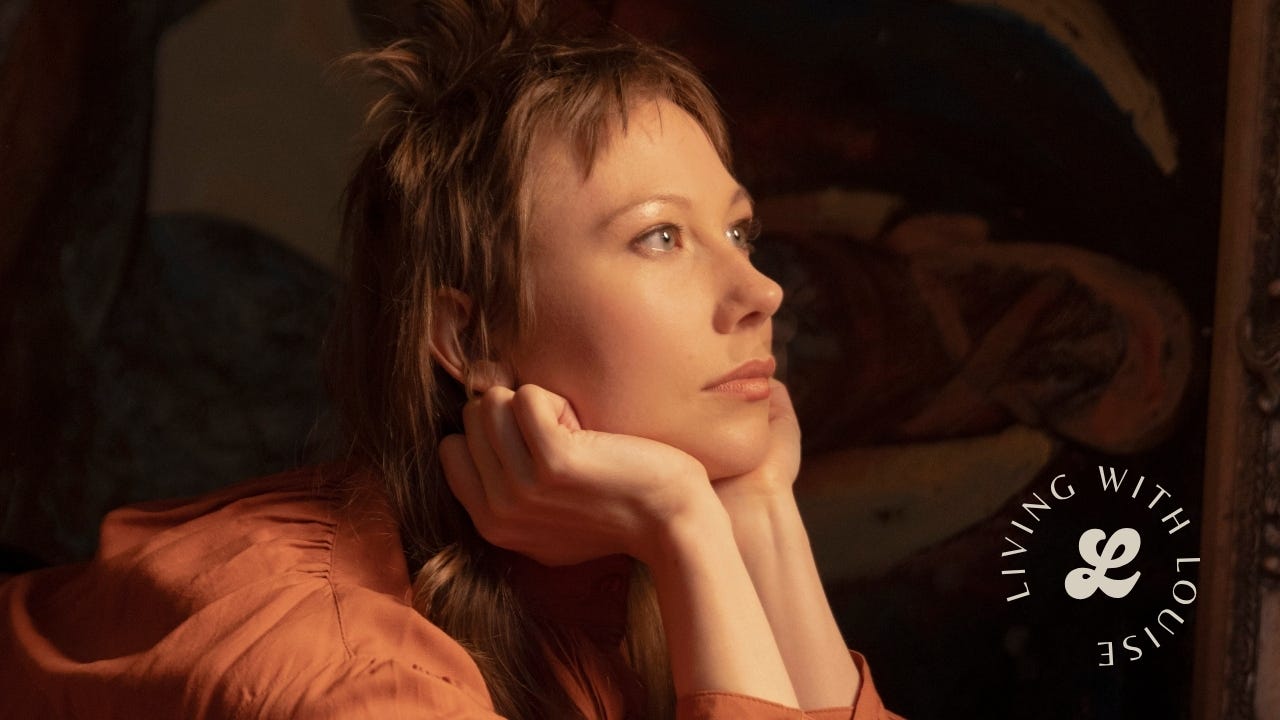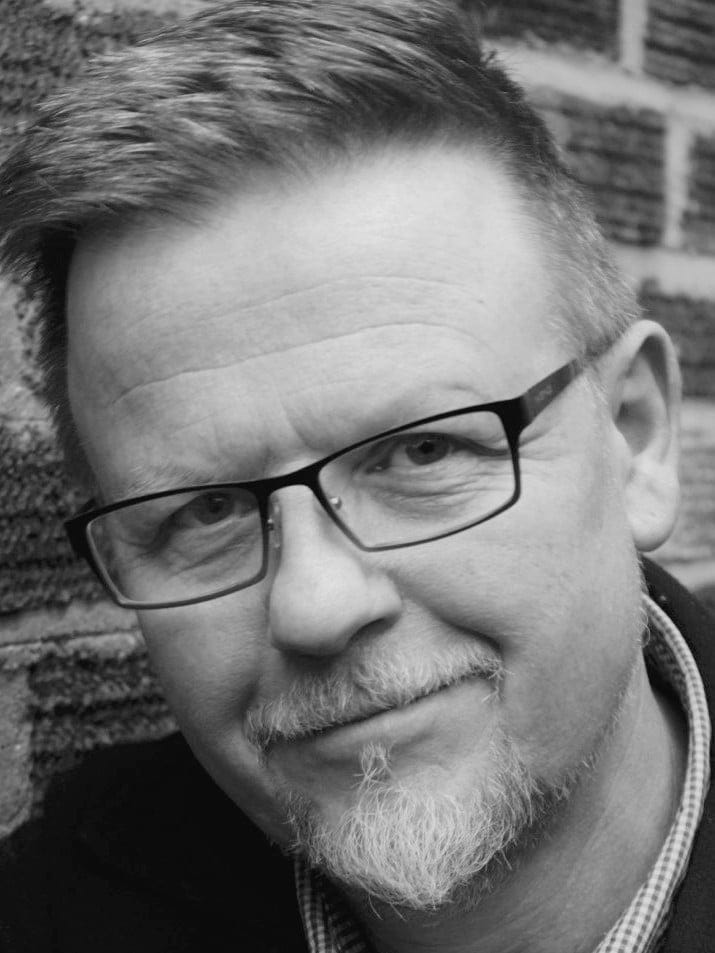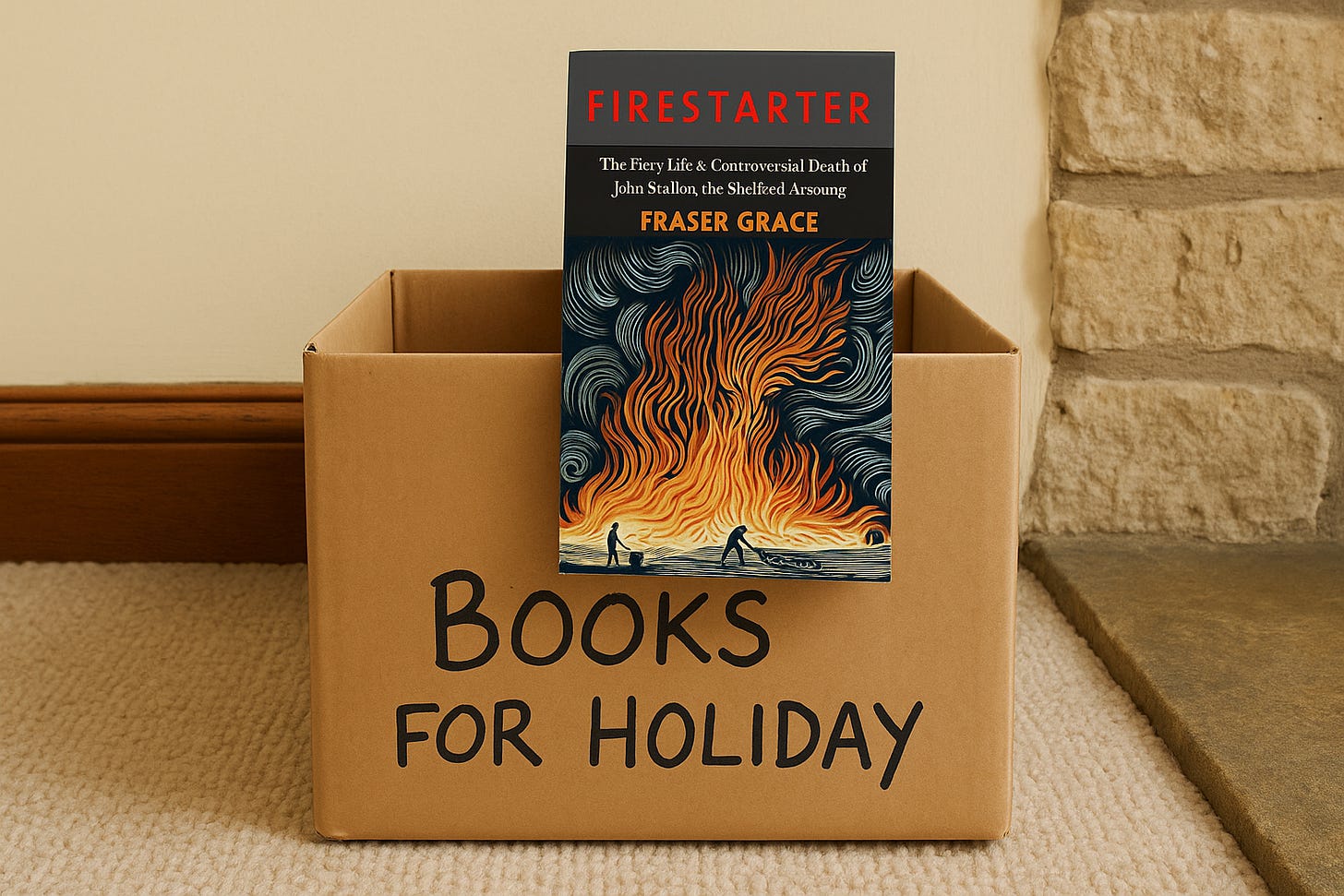No smoke without fiction
Author, playwright & screenwriter Fraser Grace and I dive into a spontaneous & unscripted convo that led us to discussing our paths to the page/stage & the role of empathy in writing.
Following on from my previous conversation with psychotherapist Jason Brooker, this conversation with Fraser Grace is the next installment of my Living with Louise experiment.
Without further ado…
Fraser Grace is the author of ten stageplays, including Breakfast with Mugabe, winner of the Arts Council’s John Whiting Award for Best Play. It was first produced by the Royal Shakespeare Company, and later broadcast on BBC Radio 3 and the World Service. Now in its 20th anniversary year, the play is currently running at the Market Theatre Johannesburg.
He is currently a Senior Teaching Associate at the University of Cambridge, co-directing the Masters’ programme in Writing for Performance. (Biography from the very site that you can purchase Fraser’s most recently published book, Firestarter).
To differentiate between speakers, Louise’s dialogue is in italics, whilst her guest, Fraser Grace is in regular text.
Hi Fraser! There’s something quite freeing about writing as you think it and seeing the other person type out their thoughts in real time…
Hello Hello!
Hi !—---
35 minute timer - set!
Go go go!
Perhaps I’ll start by welcoming you here! That’s maybe a good place to start. I appreciate you’re very busy!
And very conventional!
True. Maybe I should immediately break away from that, let’s head into unconventional territory.
Ha. Yeah why not. I think this is going to find out my typing skills - or lack thereof.
No paper has been wasted in this process, no pressure. I’d actually like to dive straight in (if you don’t mind) and get to know more about how/why you became a writer. When did you make this decision in your life?
Oooh not sure there was anything as calculated as a decision - it was the thing i could do at school. That all began with reading. There were always books in the house, but never for very long - my parents used the library a lot. When we were going away on holiday a big cardboard box would appear at the bottom of the stairs, and we were told - 4 kids - to put any books we wanted to take into it. Good parenting psychology I reckon! Of course we were all desperate to have our books in there.
That is a very wholesome insight into your childhood. Which books do you remember popping in the box?
Ha ha. Two stick out. We didn’t have a library in the village where we lived (in Derbyshire) - but a van would come round. I remember the day i chose ‘The Hobbit’ - green, blue and white cover. We always went to a caravan in Norfolk. I remember sitting inside with rain pouring down, hoping it would rain again the next day so i could read a bit more ‘Watership Down.’
You can’t see it of course, but I have a wide smile on my face. That is such a sweet memory. How old do you reckon you would have been at the time?
About eight or nine i reckon - maybe a bit older.
Do you remember when and where you were when you realised that being a writer was an ACTUAL THING. A career.
Hmmm - i always wrote stories and things - then when i got to university (first in family ever to do such a thing) - i was supposed to be studying sociology, but within a week had fallen among actors and started writing for them. BINGO! A whole new future suggested itself.
Wow. Firstly, same when it comes to going to university. Secondly, I love that meeting actors is what had a steer on your trajectory. Tell me more about this please! How did it all happen? Where did you start?!
We quickly developed a little core group that were really serious about doing this stuff, so i was always writing for actors that i knew (including myself). I suppose what i loved about theatre was the same thing i loved about the books i liked - both immersed you in other worlds, and the fun was seeing what happened.
Sounds like freedom to me.
How about your acting; was it escape, or trying out alternatives? What was the buzz for you?
What it started out as and what it developed into are ever-so-slightly different things. I suppose my love for the craft has deepened. I’ll explain. To begin with, it was escape. It was an escape from the clock that used to tick so slowly in any class that didn’t require some form of immersion (i.e. theatre, physical education, public speaking on the school council, being in the playground and helping people to make friends with each other). It was my ticket to freedom - I couldn’t do anything wrong in drama. It was the place that accepted my weirdness, my extraversion, my energy. Then, as I’ve grown older and stayed true to this core interest of mine - I’ve realised that, through the pathway of becoming a professional actor, I have learned how to become more and more myself. I do believe in what Meryl Streep says about acting, “Acting is not about being someone different. It's finding the similarity in what is apparently different, then finding myself in there.” Parts of myself that were shutdown through various experiences of life/society/judgment/whatever, have been reactivated (and dare I say, encouraged) through acting. To be able to immerse myself in a lifestyle that wholeheartedly encourages you to be your whole self (even the parts you might otherwise be ashamed of) is perhaps what gives me the buzz.
“I’ve always written about worlds i know nothing about in order to explore them.”
Great to hear. Hadn’t heard the Meryl Streep quote - I’ll remember it! The idea of theatre as a safe place to court disaster - by taking risks, asking awkward questions, trying out different approaches and imagining difference is i think a really valuable one. I’ve always written about worlds i know nothing about in order to explore them.
That’s interesting. Does that apply to the book you wrote, Firestarter?
Yes - people sometimes ask how you can write about a country you’ve never been to - but i’ve never been to the early nineteenth century either. John Stallon is an agricultural labourer in the village where i live - we missed each other by about 190 years. He comes across as a bit of a local hero by helping to fight barnfires; it takes four years before they realise he is lighting them himself…
That’s a twist! Dare I ask, do we find out about his motivations in your book?
Yes that’s one of the interesting aspects; his class of workers were very hard pressed at the time, and there were also what were called Swing Riots that broke out across the South and East of the country at the time, so it’s easy to assume a very political motive. Actually, it’s both more complicated and much simpler than that.
“The role of empathy is massive - the ability to see and feel the world as someone different from you does is almost everything.”
What did you enjoy most about the process of writing, Firestarter?
Well it was my lockdown project and probably would have been a play except that all the theatres were closed. I really enjoyed the fact i could immerse myself in that world, and work to pull together tiny bits of information to unlock its various mysteries. Nowadays we would say the labourers at the time were undocumented - apart from baptism/marriage/burial records kept by the parish church, virtually nothing is known about their lives. They were largely illiterate - wrote no letters (let alone books) - so unless anyone got in trouble with the law, they left barely a mark. I loved being able to make them visible.
That’s so brilliant. I love hearing about your relationship with the immersive nature of writing. How important do you feel it is to understand your character(s) before jumping in to writing or thinking plot?
The role of empathy is massive - the ability to see and feel the world as someone different from you does is almost everything. I’ve written about an african dictator - i’ve never met him, much less been in his situation, but i have met people who are like him in part. I know what it feels like to face such a person. The other thing you need of course, is distance - to be able to see a person in some kind of context - what it is they are really up against, as well as what they FEEL they are up against. That’s a much under-considered aspect i think - we’re all about the empathy and identity and life experience, but dispassion is also vital for a writer.
That’s a very interesting way to put it: what they’re really up against and what they FEEL they’re up against. Do you feel this ties into what they WANT and what they really NEED? Thinking about objectives that we so often love to discuss [during our time on the Writing for Performance MSt at University of Cambridge].
Yes, those are the terms i usually use, and vital for actors and dramatists to think about. What they are ‘up against’ is really about obstacles i guess - internal and external.
And indeed interpersonal. My 35 minute timer has just gone off... There’s so many more questions that have bubbled up for me in this process but I’m conscious of your time.
Well - that flew by! Great to talk to you Louise. If anyone is interested in ordering the book they can do so. Firestarter - The Fiery Life and Controversial Death of John Stallon, the Shelford Arsonist. From Galieo Publishing. Any bookshop should be able to find it.
I will include it in our conversation. Also, if you’re up for it - at another time - I’d love to dive into discussing our collaborative work on the Writing for Performance MSt at University of Cambridge ICE.
Yes that would be great.
For now, thank you very much for joining me. The time has flown by indeed - a sign of a good time!
Thanks Louise - have a great day.
Thank you!
See the creative artefact for yourself here.









Brilliant. Really enjoyed reading this.
“I’ve always written about worlds I know nothing about in order to explore them.”
I find that so inspiring.